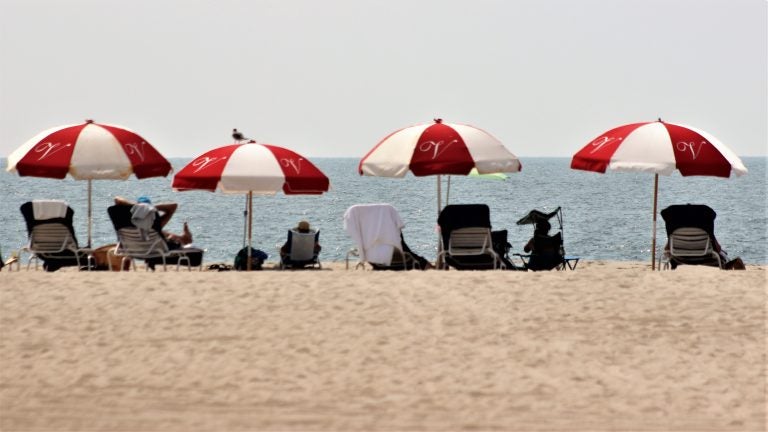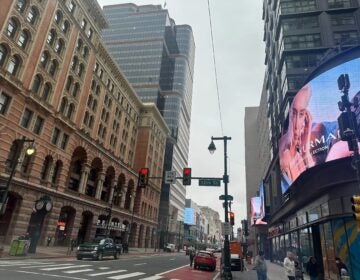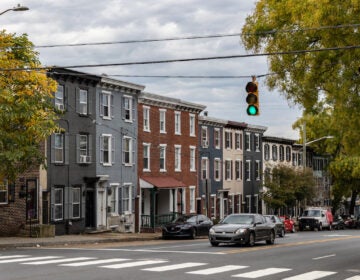How to boost Jersey Shore tourism: End state diversion of revenue for a start
The state’s lucrative tourism industry could get a significant bump if it stretched out its prime shore season past the summer months.
Listen 5:21
Beach goers taking in the sun. (Bill Barlow/for WHYY)
The state’s lucrative tourism industry could get a significant bump if it stretched out its prime shore season past the summer months. But in order to do so, it would have to invest in better event planning, more marketing and a renewed focus on public transportation, according to experts.
Lawmakers took testimony at a hearing yesterday in Atlantic City on how to boost one of New Jersey’s largest tourism sectors — the Jersey Shore. The timing of the hearing coincided with the end of the traditional summer vacation season, when shore resorts typically experience an economic slowdown as kids go back to school.
But several of the experts said good weather in New Jersey typically extends well into September, meaning the season could easily be extended to keep tourism dollars flowing. A longer season for visitors is one way to grow the market, but it might entail providing interesting events year-round.
“We now have visitors coming 52 weeks a year, and we need things for them to do,” said Cape May developer Curtis Bashaw.
The hearing, which was held at Stockton University’s new campus in the resort community, was the latest in a series convened by the Senate State Government, Wagering, Tourism and Historic Preservation Committee as it looks for ways to build upon the 100 million visitors that tourism already draws to New Jersey each year. Earlier hearings looked at ways to support the state’s burgeoning wineries and emphasize its colonial heritage in the run up to the U.S. Semiquincentennial in 2026.
Other states gain advantage
Tourism is one of New Jersey’s top industries, generating nearly $5 billion in state and local tax revenue from $43 billion of total spending by tourists, according to a recent study released by the state Division of Travel and Tourism.
But for more than a decade, the state has been shortchanging its marketing of tourism; a large share of revenue raised from hotel-room taxes that is supposed to support arts, history, and tourism has been instead diverted into the state general fund to plug budget holes. Several experts said yesterday that those budget raids have allowed other states that compete with New Jersey to gain an advantage by using more sophisticated — and better funded — branding and marketing campaigns. So even when the state hosts concerts and other events outside the prime season that would be appealing to visitors, the word doesn’t always get out because of the limited marketing budget.
“I will tell you, without a doubt, New Jersey is losing market share to competing states,” said Vicki Clark, president of the New Jersey Tourism Industry Association.
Another self-inflicted wound, she said, is the state’s education calendar, which allows some schools to resume classes before Labor Day. Other states, like nearby Maryland, don’t send their students back to school until after the holiday, which allows more families to take vacations through Labor Day and beyond. “It’s something to really take a look at,” she said.
Bruce Deifik, owner of the recently opened Ocean Resort casino, (the former Revel), urged lawmakers to make better use of Atlantic City International Airport, especially since it doesn’t face the kind of overcrowding that makes it difficult to fly into other places, including Philadelphia and Newark Liberty airports. That would also provide a boost to the region’s convention industry, which can operate year-round and it would keep hotel rooms filled in the colder months. “We already have the airport, it’s already there,” Deifik said. “It’s in very good shape.”
Atlantic City airport underused
The airport was also highlighted as an underutilized asset by Stockton University president Harvey Kesselman, who spoke of ways that a more focused transportation strategy could better serve the region. He held up Asbury Park, which is undergoing its own economic renaissance, as an example of a community with good train service that has become more than just a summertime destination for tourists.
But in South Jersey, New Jersey Transit has just shut down the Atlantic City Line for several months as it works to comply with an end-of-the-year federal deadline to install positive train-control safety equipment. And unlike Newark Liberty airport, which is served by an NJ Transit station, the AC line doesn’t connect to the sprawling Atlantic City airport even though it runs right by it.
“We need public transportation (and) we need airlines to further enhance what we have to offer,” said Kesselman, whose new Atlantic City campus is designed to provide a year-round economic boost to the still-struggling seaside resort.
“The rail lines, again, are really important,” added Sen. Jeff Van Drew (D-Cape May).
One thing the region does have going for it is a general spirit of cooperation, something that was displayed several years ago as various groups there mobilized to block an effort to establish casino gambling in North Jersey, including in the Meadowlands. A ballot question that was put before voters in 2016 was ultimately rejected by a wide margin.
On that occasion, several regional business organizations “all worked together with one common goal” to help defeat the referendum, which they believed would have crippled the region’s economy, said Debra DiLorenzo, president and chief executive of the Chamber of Commerce of Southern New Jersey.
“We continue to work together,” she said.
Even with its marketing dollars raided to plug budget holes, the state is continuing with an ambitious public-relations campaign that now reaches into places like Ohio and Canada to draw visitors, said Anthony Minick, the director of marketing for the Division of Travel and Tourism.
If more dollars are needed to support marketing efforts, one suggestion that came out of yesterday’s hearing involved taxing summer rentals, which currently are not subject to any state fees or taxes as hotel rooms are. A new tax signed into law by Gov. Phil Murphy will start hitting accommodations booked using online services like Airbnb starting next month. That means only short-term or transient rentals will be left untaxed in New Jersey, giving them a competitive advantage.
“That leaves hundreds of millions of dollars off the table,” said John Siciliano, executive director of the Wildwoods Tourism Authority.
________________________________________________
NJ Spotlight, an independent online news service on issues critical to New Jersey, makes its in-depth reporting available to NewsWorks.
WHYY is your source for fact-based, in-depth journalism and information. As a nonprofit organization, we rely on financial support from readers like you. Please give today.




